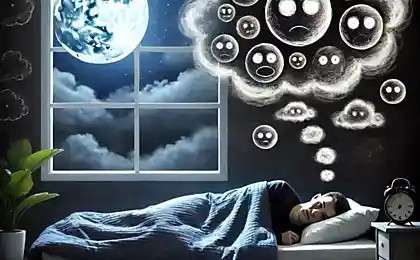270
8 Reasons Why You're Afraid of Other People's Disapproval
726668
Fear of disapproval is often felt as being in the crosshairs of universal attention.
Fear of someone else’s disapproval is one of the most common social anxieties of modern man. Many of us spend a tremendous amount of energy trying to anticipate the reactions of others and meet their expectations. This fear can be so deeply ingrained in the psyche that a person stops noticing how it affects their everyday decisions, careers, and personal relationships.
According to a study by the American Psychological Association, about 85 percent of people periodically feel anxious about what others will think of them. At the same time, for about 40%, this anxiety reaches a level that significantly affects the quality of life. But what is behind this fear, and why is it so prevalent?
In this article, we will look at eight fundamental causes of fear of disapproval and offer practical approaches to overcoming this limiting state. Understanding the underlying mechanisms of your fears is the first step to freeing yourself from their power.
1. Evolutionary predisposition
The fear of social rejection has deep evolutionary roots. For thousands of years, the human species has survived by belonging to a group. In primitive times, expulsion from the tribe often meant certain death.
Our brains are still programmed to respond to social disapproval as a serious threat. Studies using functional magnetic resonance imaging show that social rejection activates the same areas of the brain as physical pain.
This innate reaction explains why a person may experience physical discomfort, sweating and heart palpitations simply from the thought of possible criticism. It’s important to realize that what was a necessary defense mechanism for our ancestors is often overreaction in modern society.
2. Childhood experiences and upbringing
Parents’ attitudes and early experiences of socialization shape our perceptions of lifelong approval and criticism. Children raised in families with conditional love ("you will only be loved if you...") are particularly susceptible to developing fear of disapproval.

Conditional approval in childhood shapes behavior patterns in adulthood
Types of parenting that increase fear of disapproval:
- Perfectionist education, in which any mistake causes disapproval
- Authoritarian style with harsh criticism and minimal praise
- Overprotection, depriving the child of the experience of making and making their own mistakes
- Inconsistent parenting with unpredictable reactions to child behavior
- Public criticism and comparison with other children
Psychologist Carl Rogers has established a direct link between the perception of unconditional acceptance in childhood and the ability for healthy self-acceptance in adulthood. If a child has had to constantly “earn” approval, he or she will reproduce the same pattern in adulthood, constantly seeking external confirmation of his or her value.
3. Low self-esteem and self-doubt
Fear of disapproval and low self-esteem form a vicious circle: the less a person values himself, the more he depends on external evaluation, which in turn makes him even more vulnerable to criticism.
A study published in the Journal of Personality and Social Psychology found that people with low self-esteem tend to perceive neutral comments as critical and exaggerate the significance of negative reviews.
When a person does not have a strong inner core and a clear understanding of his own values, he is influenced by any opinion from outside. His self-esteem becomes fragile and depends on a constant influx of external approval, which creates constant tension and anxiety.
4. Perfectionism and high standards
Perfectionism is not just a desire for perfection, but the belief that any imperfection makes a person inferior. Perfectionists usually divide the world into black and white: either total success or total failure.
Such thinking inevitably breeds fear of criticism, since any remark is perceived not as a reason for growth, but as confirmation of its own inadequacy. Perfectionists often put things off or abandon them out of fear of not achieving the ideal and being criticized.
Signs that perfectionism fuels your fear of disapproval:
- You regularly put off tasks until you can complete them “perfectly.”
- Even minor criticism is seen as a complete failure.
- You often use the phrases “I should”, “I should”, “I must”.
- Successes quickly depreciate, and you fixate on mistakes
- You have difficulty delegation out of fear that the task will not be done to your standards.
5. Past traumatic experiences of rejection
A once experienced experience of public humiliation, rejection or ridicule can leave a deep emotional mark. The brain remembers such situations as extremely dangerous and forms defense mechanisms to avoid their recurrence.
Especially traumatic can be the experience of rejection in adolescence, when a person’s identity is still in the process of formation. One public mockery at school can form a pattern of avoidance for years when there is a risk of evaluation.
Activation of the amygdala in response to social rejection can be so strong that it forms a conditioned fear reflex. A person begins to experience anxiety even in situations that only remotely resemble the circumstances of the initial trauma.
6. Distorted thinking and cognitive distortions
Fear of disapproval is often fueled by a variety of cognitive biases—systematic errors in perception and interpretation of information.
Common cognitive biases that increase fear of disapproval:
- Mind reading Believing you know exactly what others are thinking (“She definitely thinks I’m incompetent”)
- Catastrophe The belief that negative feedback will have catastrophic consequences
- Personalization Taking on your own account events that are not directly related to you
- Filtration Focusing solely on negative reviews while ignoring positive ones
- Impairment of the positive The tendency to view positive feedback as an accident or error
The work of identifying and correcting these biases is a central element of cognitive behavioral therapy, which has been shown to be highly effective in reducing social anxiety.
7. Installation at the external locus of control
People with predominant external locus of control believe that their lives are determined primarily by external factors: luck, fate, or the actions of others. This position makes a person extremely dependent on the opinion of others.

The way to overcome the fear of disapproval lies in finding an inner compass.
In contrast, people with an internal locus of control believe in their ability to influence life events and shape their own destiny. They are less susceptible to fear of disapproval because they recognize the right to make decisions and mistakes.
Psychologist Julian Rotter, the author of the concept of the locus of control, found that people with an internal locus of control demonstrate greater resistance to stress and assess their quality of life higher.
8. Cultural and social factors
Cultural environments can significantly increase or reduce fear of disapproval. In collectivist cultures, where the well-being of the group is placed above individual comfort, the fear of violating social norms is usually stronger.
Modern social networks create additional pressure, turning approval into a measurable amount in the form of likes, comments and followers. A study by the Royal Society of Public Health found that heavy use of social media is associated with increased levels of anxiety and fear of negative evaluation.
A media culture that imposes unrealistic standards of appearance, success, and lifestyle also contributes to the fear of disapproval. People constantly compare themselves to retouched images and edited versions of others’ lives, which inevitably leads to feelings of inferiority.
How to overcome the fear of someone else’s disapproval
Practical Steps to Free Yourself from Criticism:
- Develop self-awareness. Keep a diary of emotions, tracking situations in which there is a fear of disapproval, and your reactions to them.
- Practice self-compassion. Treat yourself with the same understanding and kindness with which you would treat a close friend.
- Share your self-esteem and the opinions of others. Remember that criticism is about your actions or specific aspects, not your value as a person.
- Use the “worst-case scenario” technique. Ask yourself, “What’s the worst thing that can happen if I’m not approved?” and develop an action plan for that scenario.
- Practice gradual exposure. Intentionally put yourself in a situation with little risk of disapproval, gradually increasing complexity.
- Develop an internal locus of control. Make your own decisions regularly, starting small.
- Work with cognitive distortions. Learn to recognize and challenge irrational thoughts.
- Form a support team. Surround yourself with people who accept you as you are.
Conclusion
Fear of disapproval is not a birth defect, but the result of a complex interaction of biological, psychological and social factors. Understanding the root causes of this fear is already the first step toward liberation from its grip.
Overcoming fear of disapproval is not a one-time act, but a long process of personal growth. It is important to remember that the goal is not complete indifference to the opinions of others, but a healthy balance between receptivity to constructive feedback and loyalty to your own values and beliefs.
Ultimately, one of the most liberating truths is that most people pay far less attention to us than we think. They are too busy with their own fears, hopes and problems.
Glossary
Functional magnetic resonance imaging (fMRI)
A neuroimaging technique that measures brain activity by detecting changes in blood flow. It is used to study functional processes in the human brain.
Perfectionism
The belief that imperfection is unacceptable; the desire for perfection, the setting of extremely high standards of performance, and the inability to accept anything imperfect.
Almond-shaped
An almond-shaped area of the brain that is part of the limbic system and plays a key role in the formation and storage of memories associated with emotional events, especially fear and anxiety.
Cognitive distortions
Systematic errors in thinking that affect the decisions and judgments people make. These are deviations in information processing that may be irrational or illogical.
Cognitive behavioral therapy (CBT)
A type of psychotherapy aimed at changing dysfunctional patterns of thinking and behavior. It is based on the idea that our thoughts, feelings, and behaviors are interconnected, and changing our thinking can lead to changes in emotions and behavior.
External locus of control
The belief that a person’s life is determined primarily by external factors, such as fate, luck, or the actions of others.
Internal locus of control
The belief that a person is largely in control of the events of his life through his own efforts and decisions.























